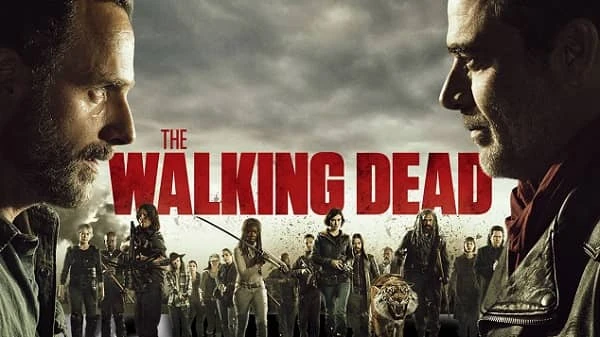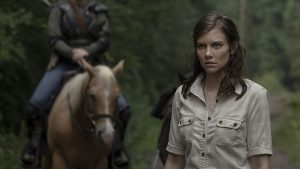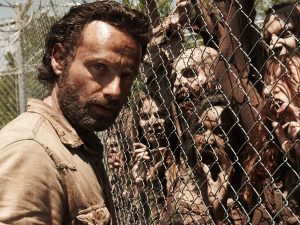”The Walking Dead 2010”
- movieslovers
- November 8, 2024

“The Walking Dead” (2010) is a post-apocalyptic horror drama television series developed by Frank Darabont and based on the comic book series of the same name by Robert Kirkman, Tony Moore, and Charlie Adlard. Premiering on AMC, the series follows a group of survivors led by former sheriff Rick Grimes (Andrew Lincoln) as they navigate a world overrun by zombies, known as “walkers.” Over its 11 seasons, The Walking Dead became a cultural phenomenon, exploring themes of survival, morality, and humanity in the face of a global catastrophe.
Plot Summary
The series begins with Rick Grimes waking up from a coma in a hospital to find that the world he knew is gone, replaced by a landscape infested with flesh-eating walkers. Rick embarks on a journey to find his family and eventually reunites with his wife, Lori (Sarah Wayne Callies), and son, Carl (Chandler Riggs), along with a small group of other survivors. Together, they face countless dangers, not only from the walkers but also from other groups of human survivors who have adapted ruthlessly to the new world.
As they travel across the desolate landscape, they encounter various characters who bring unique perspectives and challenges, including Daryl Dixon (Norman Reedus), a skilled tracker; Glenn Rhee (Steven Yeun), a resourceful former pizza delivery boy; and Michonne (Danai Gurira), a fierce warrior wielding a katana. Throughout the series, Rick’s group faces brutal enemies like The Governor (David Morrissey), Negan (Jeffrey Dean Morgan), and the terrifying Whisperers who disguise themselves as walkers to blend in with the undead.
The show delves into the psychological and moral struggles of survival, with characters grappling with difficult choices, loyalty, and the nature of humanity. Rick’s journey, in particular, is marked by his transformation from a law-abiding sheriff to a hardened leader willing to do whatever it takes to protect his people.
Key Themes
- Survival and Humanity: The Walking Dead explores what it means to stay human in a world where societal structures have collapsed, often forcing characters to make morally ambiguous decisions.
- Community and Family: With biological families scattered or lost, the show emphasizes the importance of found family and loyalty, as Rick’s group becomes each other’s family in their fight for survival.
- Moral Ambiguity: The series frequently challenges the notion of good versus evil, highlighting that people are often forced to make hard choices in extreme circumstances, blurring the lines between hero and villain.
- The Cycle of Violence: Throughout the series, violence begets violence, with different groups constantly clashing for resources, security, and dominance. The show examines the cost of this cycle and its impact on those who survive.

Notable Characters
- Rick Grimes: The series protagonist, Rick evolves from an idealistic sheriff to a ruthless survivor, embodying both the hope and darkness of humanity.
- Daryl Dixon: A fan-favorite character, Daryl is a loyal friend and skilled fighter whose growth from a lone wolf to a valued member of the group adds depth to his arc.
- Michonne: Known for her fierce independence and warrior skills, Michonne’s journey is one of healing, as she opens up to love and trust within the group.
- Negan: One of the show’s most complex villains, Negan is both brutal and charismatic, leading the Saviors with an iron fist and challenging Rick’s group in a series-defining conflict.
Reception and Cultural Impact
The Walking Dead was met with critical acclaim, especially for its first few seasons, which were praised for their suspenseful storytelling, character development, and horror elements. It quickly became a ratings powerhouse, breaking viewership records for cable television and cementing AMC’s place in scripted programming.
The show’s success led to an expansive franchise, including spin-off series like Fear the Walking Dead, The Walking Dead: World Beyond, and new spinoffs focused on key characters like Daryl and Negan. It also inspired video games, merchandise, and a loyal fan community. The show has been recognized as one of the most influential TV dramas of the 2010s, redefining horror on television and inspiring a wave of post-apocalyptic series.
Visual Style and Effects
Known for its high-quality makeup and special effects, The Walking Dead brought a cinematic approach to TV horror. The walkers, created by special effects artist Greg Nicotero, are visually gruesome and decayed, adding to the show’s sense of realism. The show’s visual style leans on desaturated colors and bleak landscapes to emphasize the post-apocalyptic setting, with tense cinematography that highlights both horror and emotional moments.
Notable Cast and Crew
- Developed by: Frank Darabont
- Key Cast:
- Andrew Lincoln as Rick Grimes
- Norman Reedus as Daryl Dixon
- Steven Yeun as Glenn Rhee
- Lauren Cohan as Maggie Greene
- Danai Gurira as Michonne
- Jeffrey Dean Morgan as Negan
- Chandler Riggs as Carl Grimes
- Melissa McBride as Carol Peletier
Fun Facts
- The Walking Dead originally premiered on Halloween night in 2010, which helped set the tone for the series.
- Andrew Lincoln and Jon Bernthal (who played Shane) trained with real police officers to prepare for their roles as former law enforcement.
- The show inspired dedicated fan events, including Walker Stalker Con, a convention for fans to meet cast members and celebrate the series.
Conclusion
The Walking Dead stands as a defining piece of television in the horror genre, exploring the darkest and most resilient aspects of human nature against a bleak, post-apocalyptic backdrop. With its compelling characters, moral complexity, and haunting portrayal of survival, the series has left an indelible mark on TV history, captivating audiences worldwide and inspiring a lasting legacy in the world of genre storytelling.











